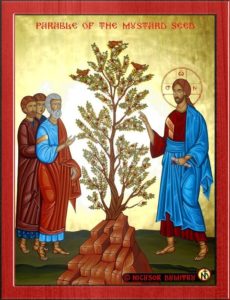15 July OS 2021 – Wednesday of the Sixth Week of Matthew; Holy Martyrs Kyrikos and Julitta; Holy Equal-to-the Apostles Great Prince Vladimir
In today’s Gospel reading, the Lord Jesus tells the Parable of the Mustard Seed and the Parable of the Leaven:
The Lord spake this parable: The kingdom of heaven is like to a grain of mustard seed, which a man took, and sowed in his field: Which indeed is the least of all seeds: but when it is grown, it is the greatest among herbs, and becometh a tree, so that the birds of the air come and lodge in the branches thereof. Another parable spake he unto them; The kingdom of heaven is like unto leaven, which a woman took, and hid in three measures of meal, till the whole was leavened. All these things spake Jesus unto the multitude in parables; and without a parable spake he not unto them: That it might be fulfilled which was spoken by the prophet, saying, I will open my mouth in parables; I will utter things which have been kept secret from the foundation of the world.
Then Jesus sent the multitude away, and went into the house. – Matthew 13:31-36
St. Theophan the Recluse, commenting on Our Lord’s words, explains how we can apply the images of the mustard seed and the leaven both to the Church and to our own spiritual lives:
The Kingdom is like a grain of mustard seed and leaven. A small grain of mustard seed grows up into a large bush; leaven penetrates a whole lump of dough and makes it leavened. Here, on the one hand, is an image of the Church, which in the beginning consisted only of the Apostles and a few other people. It then spread and became more numerous, penetrating all of humanity. On the other hand, it is an image of the spiritual life revealed in every person. Its first seed is the intention and determination to be saved through pleasing God in accordance with faith in the Lord and Savior. This determination, no matter how firm, is like a tiny speck. Its movement and strength multiply and mature within its own self, and it begins to penetrate all the powers of the soul – the mind, will, and feelings – then fills them with itself, leavens them according to its spirit, and penetrates the entire constitution of the human nature – body, soul, and spirit – in which it was engendered. – Thoughts for Each Day of the Year, p. 144
The seed, then, of spiritual life, is the “intention and determination to be saved through pleasing God in accordance with faith in the Lord and Savior.” There are three elements to this: Intention and determination to be saved, pleasing God, and faith.
We can check ourselves every day, and ask ourselves, “Do I intend to be saved, am I determined to be saved?” It cannot be a vague wish, as we would vaguely wish for someone to hand us a million dollars, though we neither think it likely nor make any efforts towards obtaining our wish. We have to intend it, choose it, set out decisively to get it, with determination. When our intention becomes unsteady or our determination weakens, we must ask the Lord to clarify our minds and strengthen our wills.
Every day we should ask ourselves, “Do I desire to please God?” and we should ask the Lord to strengthen this desire in us. It is impossible to overestimate the power of the desire to please God, to do His holy will. Once someone is irrevocably committed to the doing of God’s will, he will receive very great power from God to do so. The Lord will strengthen his will, and he will experience the truth of the words that with God nothing is impossible.
“Very well,” you may say, “I do intend and I do will, but weakly, and sometimes it seems like such a dry experience. Often I approach it as though it were a Stoic self-improvement program.” At this point we must recall the third element in the “program” St. Theophan outlines: Faith. We must beg with tears for Faith, which, on our part, is the voluntary assent of the mind to divine Truth, but is also, on God’s part, a free gift of His grace, without which the act of Faith on our part is impossible.
When our will grows weak and the clarity of our intention grows blurry, let us open the Holy Gospel and start reading slowly aloud. Let us read the Life of a saint. Let us kneel before the holy icons and carefully, slowly, read the Akathist to Our Sweetest Lord Jesus Christ or His Most Pure Mother. Let us carefully confess and prepare for Holy Communion. The sweetness of His love, the vision of His divine beauty, shall once again captivate our hearts, and we will remember why we made our original act of will to be saved, and that will shall grow strong again. We will remember the end of Faith, which is Charity – Divine Love – and, unable to forget the Beauty of that Divine Love, we will open our hearts to Faith, and the Hope born of courage will be not barren but rather give birth to many fruitful acts of the will to do good.
O Lord, Who desirest our salvation, make to grow the seed of Faith in our hearts, give us firm Hope in our salvation, and deprive us not of the ultimate vision of Love, the beauty of Thy countenance forever. Amen.

